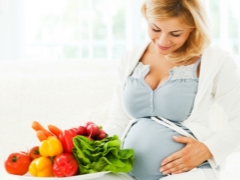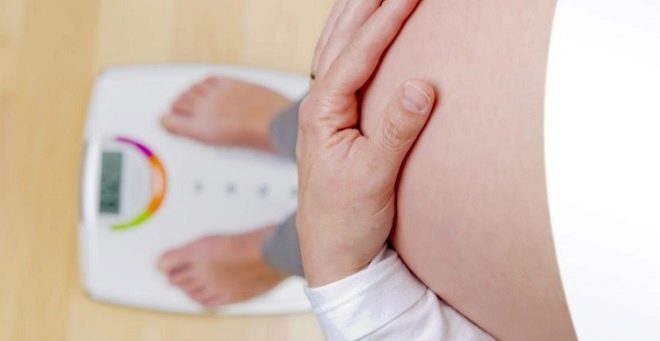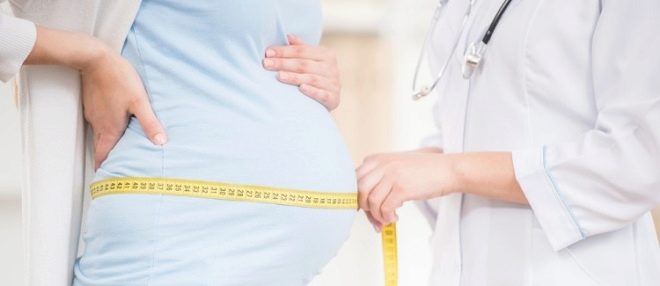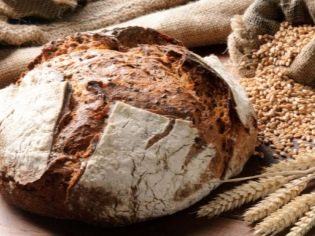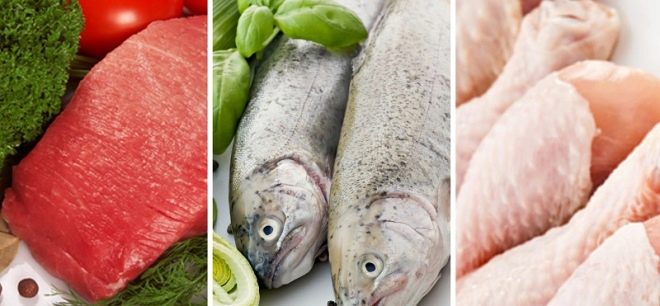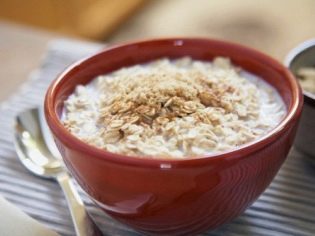How to choose a diet for weight loss during pregnancy?
Overweight or overweight can seriously complicate the course of pregnancy and harm the mother and baby. That is why obstetricians analyze the dynamics, weighing the woman at each scheduled admission.
If the weight increases too quickly and exceeds reasonable limits, the expectant mother is recommended to go on a diet. In this article we will tell you what kind of diet should be preferred during pregnancy.
What should be the weight?
When a woman is in an “interesting position,” weight gain is inevitable and quite natural. From the very beginning of the period of gestation of the baby under the influence of the hormone progesterone, the woman's appetite improves, weight gain begins.
Physiologically, the future mom's body weight increases at least by the weight of the fetus, by the weight of the amniotic fluid and the placenta. In addition, "approved" progesterone small fat deposits, for example, at the waist, hips, the front wall of the peritoneum are also considered physiological, natural. They protect a child who grows under the heart.
Normal is considered to increase within 10-15 kilograms for all nine months of waiting. In this case, doctors must take into account the complexion of women before pregnancy.
A girl with a normal weight gain can add up to 15 kilograms, which will be normal. The lady with curvaceous and a slight excess of kilograms increase in the norm can be up to 11 pounds. And for a woman suffering from obesity, for nine months it is “allowed” to take no more than 7-8 kilograms.
About 40% of the total increase usually falls on 1 term, and 60% - for 2 and 3 trimester. If the weight gain is too large, the doctor will definitely recommend that you review your lifestyle and diet.
Dietary requirements
Losing weight is not an easy task. It is especially difficult during pregnancy, because most of the existing diets for pregnant women are contraindicated. Even if a woman used to successfully use a protein or salt-free diet to reduce weight, she had an excellent result from them, then she would not be able to return to the tried and tested diet during the period she was carrying the baby.
To combat the pathological increase, other methods will be needed that will allow, albeit slowly but without harm to the child throw off those extra pounds.
Diet during pregnancy should be balanced, because the child can not be deprived of any nutrients, vitamins. For him, important and proteins, and fats, and carbohydrates. Therefore, a woman will have to ensure that each meal contains all the necessary components, but in quantities that will not allow the woman to increase her own weight further.
Danger of pathological gains
The reasons why a woman’s body, even trying to keep track of her nutrition, begins to accumulate extra pounds “in reserve” can be varied. Most often, the explanation lies in the individual characteristics and speed of metabolic processes. It is not the task of the gynecologist to search for the causes of excess weight, but it is the duty to tell you how this overweight is dangerous for a pregnant woman and her child.
When overweight occurs quite the real threat of late toxicosis. This late condition can be very dangerous. The blood flow in the uteroplacental system with excess kilograms is disturbed, which threatens the development of fetal hypoxia, the birth of a baby with neurological and other disorders.
Future mothers with excess weight have a risk of premature aging of the placenta, and there is also a rather high probability of having a baby before the planned obstetric period or carrying it.
Women with excessive pathological increase often develop weakness of labor forces, and they have to do an emergency cesarean section. With a lot of weight mom often and the weight of the baby exceeds the norm. For a woman, an excessive increase can turn into varicose veins, the appearance of hemorrhoids, and the load on the heart and blood vessels also increases significantly.
The reasons may lie not only in the fact that a woman overeat, but also in hormonal processes. With excessive production of lactogen, progesterone or hCG, weight arrives much faster.
Sedentary lifestyles, which lead some expectant mothers, also affects their weight and the rate of accumulation of fat.
Basic principles of diet for pregnant women
Despite the fact that modern nutritionists have questioned the method of counting calories, nothing is more effective than relying on the caloric content of foods and dishes until it is invented. It is not necessary to calculate the calories for each unit, it will be quite enough if the woman simply focuses on the approximate caloric content.
Eating should be fractional - 5-6 times a day, portions should be reduced. What the future mother could eat at one time, it is better to divide into two plates and eat with a difference of 3-4 hours.
All food should be chewed thoroughly. Important culinary treatment is important - do not fry vegetables in deep fat - It will be better if baked in the oven. Smoked sausage is better to replace boiled meatballs, and salted fish - a piece of baked fish fillet.
If the gestation period is more than 28 weeks, the woman is allowed to arrange one unloading day per week. During this day, she will be able to accept fractional (6-7 times per day) one product - either fermented milk without sugar and fruit, or 500 grams of low-fat cottage cheese, or boiled buckwheat without salt and sugar. By the way, during the fasting days, salt and sugar should be completely avoided.
Every day in the diet of a pregnant woman should be more food containing fiber, less simple carbohydrates (buns and sweets) and more complex carbohydrates (sweet fruits). The last evening meal should occur no later than 2.5 hours before bedtime, it should not contain fat, large amounts of proteins and carbohydrates.
The maximum number of calories per day for a pregnant woman who is going to lose weight is located within 2200-2500 Kcal. They should consist of 100-120 grams of proteins (most of this amount should be animal proteins - meat, milk, fish, eggs, dairy products), 90 grams of fat (half of this amount is of plant origin), 350 grams carbohydrates.
To achieve the desired result, it is important to categorically reject smoked, pickled and spicy foods, carbonated drinks, fried and fatty foods, sweet pastries, jam, jam. The amount of salt should be reduced to 5 grams per day.
Excess salt provokes the occurrence of edema, as it retains fluid in the tissues. Even if rapid weight gain occurs without edema, the amount of salt should still be reduced to prevent preeclampsia, the likelihood of which increases with excess weight.
Some pregnant women refuse salt altogether, believing that it will be more beneficial for them, but this is a common misconception. The complete lack of salt violates the water-salt balance in the body., which is also a dangerous phenomenon.
If the pregnancy proceeds without edema, you should drink at least 2 liters of clean drinking water per day. If swelling occurs, the amount of fluid that should be drunk per day should be coordinated with your doctor. You should not drink strong tea and coffee, even if the doctor allows a woman (for example, with hypotension) a cup or two of coffee a day. It is best to drink plain water, but allowed the broth hips and weakly brewed tea.
A woman will have to control her appetite. In order to make it easier to do, it is necessary to abandon the products that stimulate the appetite. These are garlic and onions, canned food, spices, pepper, mayonnaise, ketchup, various sauces and snacks.
What can you eat?
The menu for every day, for a week, for a month a woman can make on her own, especially since such a diet does not require large financial expenses. Monodiets are usually costly, but they cannot be combined with pregnancy.
To make your diet, it is important to remember that calories per day should gain no more than 2200-2500, This amount should be divided by 6, thus determining the caloric content of each meal.
At each reception include carbohydrates, proteins and fats, with the exception of the evening meal, in which fat should not be. Now you can start planning the menu.
First meal
All soups should be cooked in a lean, lean broth. It is better for him to choose red meats (beef, veal). It is useful to boil the broth in chicken, turkey or rabbit meat.
Fish broths are acceptable if low-fat fish are used for them (for example, pollock). Do not cook soup with pork or lamb.
Potatoes and cereals can be added to soups, but in very moderate quantities, so that the spoon in the soup will float, not “stand”. You should not add spices to diet soup, as an exception you can put bay leaf.
The total amount of the first dishes per day is 200 milliliters. You can eat this amount at a time, for example, at lunch, and can be divided into two times and eat a ladle for lunch and dinner.
You should not plan to the first dish of a large amount of bread. A pregnant woman who needs to lose weight should not take more than 100 grams of baked goods per day. It is better to give preference to rye bread is not the "first freshness", as well as bread and bran.
You should not add mayonnaise or fat sour cream to the soup. "Whiten" soup or soup can be a couple of tablespoons of milk.
Second courses
Meat products in the diet should be no more than 150 grams per day. Thus, you can plan a piece of boiled chicken breast in one meal, steam patty or meatballs - in another, fish boiled or baked fillet - in the third.
Meat is chosen lean, giving preference to beef and veal, rabbit, chicken. You should not buy meat semi-finished products: they have too much fat and extraneous additives that are not at all beneficial for the future mother's body.
Garnish for meat or fish dish is selected at the rate of not more than 300 grams of carbohydrates per day. Thus, you can boil 150g with a steam patty. buckwheat-ricarice, the same amount of rice, or put out zucchini, cabbage, pumpkin.
Potatoes and pasta with pasta are best left until better times. While they can be added in small quantities only in soups.
Fat, necessary for the normal assimilation of many vitamins, a woman receives from meat products and milk. One of the meals should consist only of milk, such as afternoon tea.
Low-fat cow's milk can drink up to 200 milliliters at a time. Be sure to every day in the composition of the main course sunflower or olive oil 1-2 tablespoons per day. You can fill them with vegetable salads.
Salads are desirable to complement any meal. Useful fresh tomatoes, bell peppers, cucumbers, cabbage and carrots. Do not add onion and garlic to the salad, so as not to “whet” your appetite. Fresh greens are permissible and desirable, but only as a seasoning for the first and second courses.
Breakfasts and snacks
For breakfast it is best to take cereal porridge. You can cook them in water or skimmed milk. For porridge, oatmeal, millet, rice are well suited. Corn grits and semolina should be avoided.
Complement the breakfast will help slow carbohydrates - fruit juice without sugar (freshly squeezed) or fruit in general form. From fruit it is good to use apples, kiwi, pineapples, pears. Bananas are best limited, as are grapes.
Chicken eggs are useful, but in a small amount - no more than one or two pieces per week. When preparing the menu, a woman can schedule one day, in which she will prepare an omelet from two eggs for breakfast or an afternoon snack, or two days, on which she will eat one boiled soft-boiled egg.
The drinks
Without the risk of gaining extra pounds, you can include in the menu a weak tea with milk without sugar, unsweetened fruit or berry compote, homemade juice, dogrose broth, mineral water without gas.
List of allowed products
The list of permitted products is as follows (in brackets is the caloric value per 100 g. Of product):
- squash (24);
- cauliflower (30);
- potatoes (80);
- carrots (32);
- apricots (41);
- watermelon (25);
- melon (33);
- peaches (46);
- apples (47);
- strawberries (41);
- raspberry (46);
- buckwheat (313);
- oatmeal (366);
- rice (344);
- milk (64);
- kefir (1.5-2%) (51);
- sour cream (15%) (158);
- low-fat cottage cheese (101);
- beef (254);
- veal (131);
- rabbit meat (156);
- chicken (170);
- turkey (84);
- eggs (157).
What should be limited in whole or in part?
In an attempt to lose weight during pregnancy, you should stop eating fatty rich broths, white bread, buns and buns, pork and lamb.
Sausages, sausages, smoked breasts and rolls, canned food, dumplings are banned. You should not include in the menu crab sticks, salted fish and canned from it, as well as fatty varieties of marine fish such as mackerel or herring.
In no way can margarine, mayonnaise and mayonnaise sauces, cakes and pastries, sweets, factory cookies and waffles. It is restricted to take pastila, marshmallows, dark chocolate. The limitation is pretty tough - so per day you can eat only 15 grams of dark chocolate provided that all other meals and drinks will be savory.
The list of products undesirable for weight loss includes peas and other legumes, beans and lentils, pearl barley, and semolina. Beets and radishes are included in the diet is very limited.
Butter, without which it is difficult to imagine tasty morning cereal porridge, can be used, but in small quantities - no more than 15 grams per day. You should choose a good oil, without vegetable impurities (no spreads).
A decisive battle is declared on condensed milk, factory ice cream, whole fast food, no matter how attractive it may look, as well as melted cheese curds, curd mass and colorful factory yoghurt, which is rich not in fruits and berries, but dyes and preservatives.
Bananas and grapes are also best left until better times. Do not lean on mushroom dishes, because mushrooms are poorly absorbed by the body. From jam and jelly, even if they are cooked by the grandmother and with love, you should refrain. The same ban is imposed on rosehip syrup, as well as on all kissels.
Everything said about the prohibited products is not a guide to action, but only a wish. A woman may include a piece of fatty fish in the day menu, but she must understand that the piece must be very small, and the subsequent restriction on fat in all other daily meals will be quite noticeable.
Diet
As already mentioned, the power should be fractional. Optimally eat 5-6 times a day.
It is better to start breakfast half an hour after waking up, 10 minutes before it having drunk a glass of water at room temperature. This will help "start" the processes of digestion after a night's sleep. The intervals between meals should be about 3 hours.
Thus, if breakfast was at 9 am, then:
- lunch is best scheduled for 12.00;
- afternoon tea - at 15.00;
- dinner at 18.00.
It is better to make two more “snacks” between breakfast and lunch (at 10.30) and after dinner, but no later than 2.5 hours before bedtime.
If a woman goes to bed at 23 o'clock, then the extreme time for a snack should be no later than at 20.30.
How to improve the effectiveness of the diet?
The above diet for pregnant women can reduce weight by about 2-3 kilograms per month. Weight loss at a faster rate for future mothers is contraindicated, because it affects the metabolism, and pregnancy can be complicated.
To make the process of losing weight more efficient, it is advisable not to avoid good physical exertion. You shouldn’t “kill yourself” in the gym; it’s enough to do light gymnastics once a day, designed specifically for women who are going to become mothers. This will not only help in getting rid of extra pounds, but also contribute to the preparation of muscles for the upcoming labor.
It is useful to make once a day hiking in the fresh air. Optimally conduct it in the evening, before bedtime.
The diet will be more effective if a woman controls her hormones. To do this, ask the doctor for a referral for hormonal blood analysis, if he did not give it earlier.
Pregnant women who are opposed to abnormal weight gain can go swimming, aqua aerobics, especially since many sports facilities offer such group and individual classes under the supervision of experienced trainers.
Deciding on the introduction of additional physical activity, be sure to consult with your obstetrician-gynecologistwho can accurately answer the question of whether a particular woman can swim, attend yoga classes and so on.
Reviews
The topic of weight is one of the most popular and discussed by pregnant women in numerous forums on the Internet. Many, going on a diet, do not believe in performance. However, the majority of future mothers, if they observe all the principles of the described diet, lose for the second or third trimesters from 5 kilograms or more.
Women emphasize that this diet does not require extra money and time. The menu, compiled for the week, costs about 2000-2500 thousand rubles. Less - there is often a need, which is not very convenient for workers.
In the next video, nutritionist nutritional advice during pregnancy is waiting for you.
